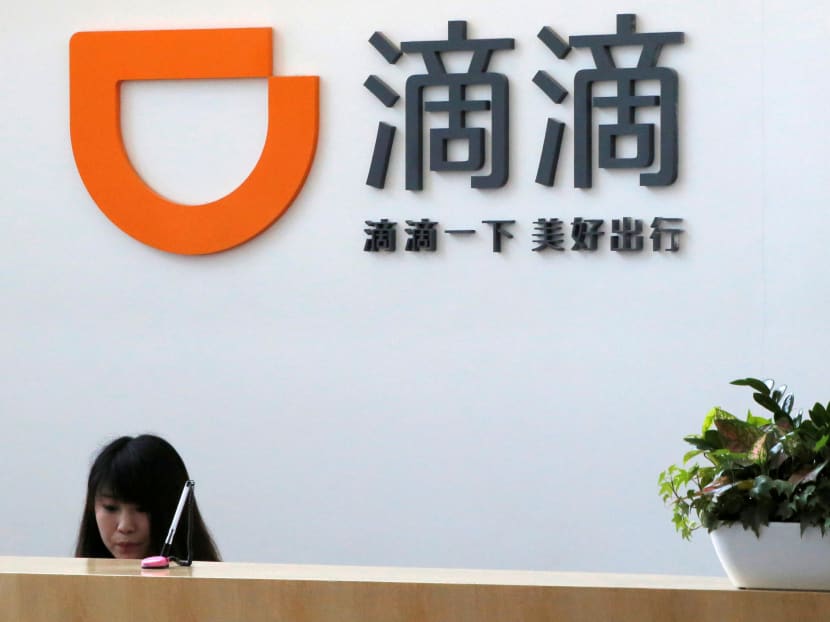China’s Didi raises S$5.4b to go global as battle of ride-hailing apps intensifies
BEIJING — Chinese ride-hailing firm Didi Chuxing Technology on Thursday (Dec 21) said it has raised US$4 billion (S$5.38 billion) in funds earmarked for expansion overseas and into areas such as artificial intelligence (AI), as it looks to challenge Uber Technologies.

Didi Chuxing has expanded overseas rapidly in the past year since sealing its dominance in China. Photo: Reuters
BEIJING — Chinese ride-hailing firm Didi Chuxing Technology on Thursday (Dec 21) said it has raised US$4 billion (S$5.38 billion) in funds earmarked for expansion overseas and into areas such as artificial intelligence (AI), as it looks to challenge Uber Technologies.
The fund-raising pushed its valuation to about US$56 billion and lifts cash reserves to $12 billion, people familiar with the matter said, asking to not be identified as the details are private.
The fundraising values Didi at over US$50 billion and involved Abu Dhabi state fund Mubadala Capital, and existing investor SoftBank Group Corp.
“With a substantial cash reserve, Didi plans to scale up investments in AI talent and technologies,” Didi said in a statement. The funds would also help Didi “bring more innovative and diversified transportation services to broader communities around the world.”
Didi has expanded overseas rapidly in the past year since sealing its dominance in China with the purchase of Uber’s local business in 2016, ending a cash-burning subsidy war that cost the United States firm roughly US$2 billion.
Earlier this month Reuters reported that Didi was planning to enter Mexico next year, in what would be its first overseas operation not managed through a local partner.
On Wednesday, Didi announced it was looking at entering the Taiwanese market, and had authorised a franchisee operator to do research there on its behalf.
Didi has also invested in several of Uber’s rivals globally, including US-based Lyft, Brazil’s 99, India’s Ola, Singapore-based Grab, Estonia’s Taxify and Careem in the Middle East.
Didi’s expansion coincides with a difficult period for Uber, which is grappling with heightened regulatory scrutiny in Europe and a series of scandals.
Those ran the gamut from a leak of 57 million rider and driver records to revelations that the company spied on competitors. Uber, the world’s most valuable startup, lost US$1.5 billion in the third quarter, up from US$1.1 billion in the prior quarter.
“The new round is pretty important for Didi. With the Chinese market very much stabilised, Didi has to go out to find new growth opportunities,” said Will Tao, an analyst with consultancy iResearch.
“Its first steps in overseas expansion should be in Southeast Asian markets like Vietnam and Malaysia, because Uber has a strong presence in Europe and the US”.
The new funding comes after Didi raised more than US$5.5 billion in April, a record round led by SoftBank.
Matthew Nicholson, a spokesman for Tokyo-based SoftBank, confirmed the latest investment came from the company itself rather than the SoftBankVision Fund spearheaded by Masayoshi Son.
Didi is already one of China’s most richly funded private companies: its backers range from the country’s sovereign wealth fund to e-commerce giant Alibaba Group Holding, WeChat-operator Tencent Holdings and Apple.
But it needs the capital to expand its research into artificial intelligence and autonomous car technologies, areas in which the industry’s largest companies -- including Uber and Alphabet - are pouring resources.
All are vying for leadership in technology that will transform mobility, while also representing a massive opportunity to reduce costs. The Chinese firm’s advantage may be data on its 450 million-plus users scattered across some 400 cities. It opened an artificial intelligence lab in Mountain View, California this year that’s lured dozens of stalwarts in the field.
“The optimisation of maps and route designs takes a great deal of effort from deep learning,” Mr Tao said. AGENCIES






